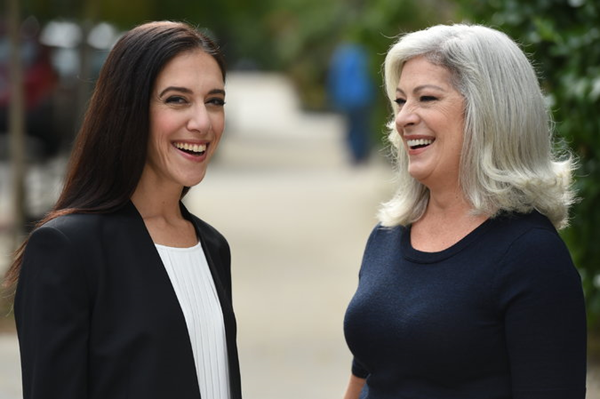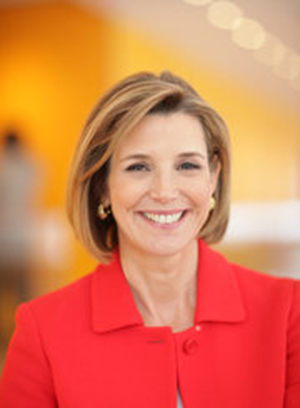|

Your Money
Financial Advice
for Women, From Women
NOV. 9,
2015
|

Amanda Steinberg,
left, and Michelle Smith are joining forces to create an online
investment firm called WorthFM, a financial services firm aimed
at women.
Credit Jordan Matter |
It’s
been a long time since a talking teenage Barbie doll uttered
the words, “Math class is tough!” That was 1992, and the
uproar that ensued caused Mattel
to banish the words from Barbie’s vocabulary.
Today,
as men’s and women’s traditional roles continue to blur, companies are
even more careful not to reinforce gender stereotypes.
Yet at
the same time, two new online investment firms — known as robo-advisers
— are introducing products that suggest women need extra hand-holding
with their money. They are offering financial and investment advice
tailored just for females.
Women
are increasingly their households’
breadwinners, and they are more
likely than men to enroll in and complete
college. Women are also a growing
market, exercising decision-making control of an estimated
$11.2 trillion in investable
assets, according to the Center for Talent Innovation.
But do
they really need specialized help — any more than the sort of
personalized attention that many consumers crave? Or are these firms,
backed by big investors, simply grasping for women’s growing wallets?
Amanda Steinberg — founder of
DailyWorth, which sends its 1.2 million female subscribers
daily emails about money — will soon introduce a robo-adviser for
women with
Michelle Smith, whose firm
Source
Financial Advisors caters to multimillionaire women who
have been divorced. Their new service,
Worth Financial Management, will
make its debut next year. But the gendered focus isn’t necessarily
being driven by women’s need for extra help, Ms. Steinberg said, and
is instead the response to a dialogue she has had with her subscribers
for nearly seven years.
“I
know they don’t like what is out there,” Ms. Steinberg, a programmer,
said of her subscribers, who, on average, are 38 years old and earn
$78,000. “My mission from the beginning was about empowering women to
build net worth. Not to get better at budgeting, not to save $10 when
buying flowers for their dinner party. It was to give them control
over their futures.”
Women
surely face their own set of challenges. They generally earn less than
men, are more likely to take breaks from the work force, and live
longer, all intractable issues that demand societal and policy
changes, like less male-focused workplaces and policies.
Helping women account for these handicaps is what is driving
Sallie Krawcheck, a former Wall
Street executive, into the same business: She recently announced
plans to introduce her own robo-adviser,
Ellevest,
next year.
“Men
have more room for error,” said Ms. Krawcheck, who became well known
on Wall Street after she graced the cover of Fortune in 2002 as one of
Wall Street’s “last honest analysts.” She has held high-ranking
positions at Bank of America and
Citigroup, and along with her co-founder, Charlie Kroll, raised $10
million for her new venture from several heavy hitters (mostly men) in
the financial industry.
She
declined to provide details about the service, but here is hoping Ms.
Krawcheck will veer far from her Wall Street roots and use her stature
to provide the kind of low-cost, comprehensive advice that is still
more difficult for nonwealthy people to come by.
The
women at WorthFM, as the firm will be known, both divorced single
mothers with an unstoppable entrepreneurial drive, have already mapped
out their approach and raised $2 million from investors — all divorced
women. They will focus on the mass affluent, generally someone with
less than $500,000 to invest. That amount is usually not enough to
capture the attention of many human advisers (who generally charge 1
percent of assets) because of sheer economics.
But an
integral part of WorthFM’s approach is to act a tad more like a human
adviser — that is, build a relationship first and then get into all
the money stuff.
So how
does one go about building a relationship with a robot? Apparently, by
making a woman feel that she has been heard.
To do
that, they need to learn how she relates to money. They will ask her
to complete a “MoneyType”
assessment, a 40-question survey the company developed with a
psychologist. The results, they say, will reveal her perspective and
behavioral relationship with money — one dominant type or some
combination of the five types may emerge.
With
that information in hand, the service will personalize the woman’s
path through the site, taking into account her financial circumstances
and knowledge about finance.
The
women who value money as a means to pleasure might first be presented
with a video featuring the co-founders, in an attempt to engage them.
Those who see money as a means to stability and control might see a
savings chart or more explicit directions on what to do next. The
robot will also take note of how many times the client logs in.
The
idea is to keep the user interested and to build her confidence. “Our
job is to get to know her and reflect back to her what is important to
her,” Ms. Steinberg said. “We are feeling out her level of intensity
so we can be responsive to her instead of pushing her.”
Ms. Smith said it amounted to digitizing the type of experience you
can have in a human adviser’s office. “Good advisers do this first,”
Ms. Smith said. “They don’t come out with their proposal and say,
‘Pick a plan! Pick a plan!’ ”
|

Sallie Krawcheck,
a longtime Wall Street executive, will soon introduce her own
robo-adviser, Ellevest.
Credit Tony Cenicola/The New York
Times
|
|
The
overriding goal, however, is the same for all users. Once an account
is in place, the site will guide users to set up two separate pots: a
short-term savings account, with the goal of contributing three months
of net income (you can link to an outside account); and a longer-term
account for
retirement savings (like an
individual
retirement account or a taxable
brokerage account). They will recommend one of five diversified
portfolios of low-cost
exchange-traded funds, though
more account types and funds are expected to come later (including
joint accounts that can be held with male partners or husbands).
Users
will have the ability to automate their savings, but within six
months, the service plans to introduce an algorithm to figure it out
for them. Based on recurring patterns in the user’s income and
expenses, it will automatically shuttle a safe amount into savings or
investments, similar to what the
Digit app does now, with the
user’s permission.
“The
focusing on where all of your money goes is a frustrating and
impossible process for a lot of people,” Ms. Steinberg said. “So we
are inverting it by thinking about your buckets. It’s not ‘Do I go out
to dinner or do I not?’ It’s savings.”
Ms.
Steinberg said her firm planned to measure its success with one
yardstick: It aimed to increase each women’s net worth by 30 percent
over five years.
Building one’s net worth is just as much about chipping away at debt
as it is as building savings. And one of the biggest weaknesses of
robo-advisers is that they fail to address a person’s entire financial
picture as a human adviser might, instead focusing on the handful of
investment accounts they offer. Ms. Steinberg said she wanted to
address the whole picture, including debt management, but that would
come later.
WorthFM will charge one all-inclusive fee — including underlying
investments — that is generally competitive with those of other
robo-advisers, which
charge anywhere from 0.15 to 0.50
of total investable assets. (They declined to provide specifics
because they hadn’t yet filed pricing data with regulators.)
According to a 2009 report by the Boston Consulting Group, there is a
huge opportunity to capture women’s wallets — “one that can be
immensely profitable for financial institutions,” the report said,
noting that women continually feel exasperated by the poor way
financial companies treat them.
Robo-advisers
deliver the same product to everyone. But even some of the leading
firms in this category, including
Betterment and
WealthFront, each with $3 billion
under management, admit that their customers are largely male.
WorthFM and Ellevest aren’t the first to try to win women’s wallets.
LearnVest, which sells
comprehensive
financial advice, started in 2009
as a budgeting website directed at women, but it eventually broadened
out to include men, too. In March, it was acquired by Northwestern
Mutual. With only about 10,000 customers paying for its standard
financial plans at that time, its fate is now unclear.
“The
economics of the industry are tough,” said Manisha Thakor, director of
wealth strategies for women at Buckingham, an investment advisory
firm.
Interestingly, women may actually be better savers and investors than
men. “Women do it a little bit better,” said Jean Young, a senior
research analyst at Vanguard, who recently completed a
study that found that females
tend to save more, on a percentage basis, in their 401(k) plans than
their male counterparts.
“They
are more likely to be in the plan, they save more when they are in the
plan, they trade less and they take advantage of professional
management,” she added.
Their
problem? Even though they squirrel away more, the average man’s
account balance is about 50 percent larger, largely because women earn
less on average.
And
that can’t be solved by any robo-adviser.
Correction: November 6, 2015
An earlier version of the picture caption with this column reversed
the identities of the two women shown. Amanda Steinberg is on the left
and Michelle Smith on the right.
A version
of this article appears in print on November 7, 2015, on page B1 of
the New York edition with the headline: Financial Advice for
Women, From Women .
© 2015 The
New York Times Company |